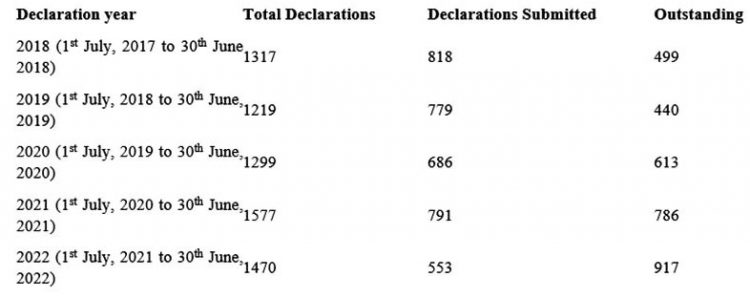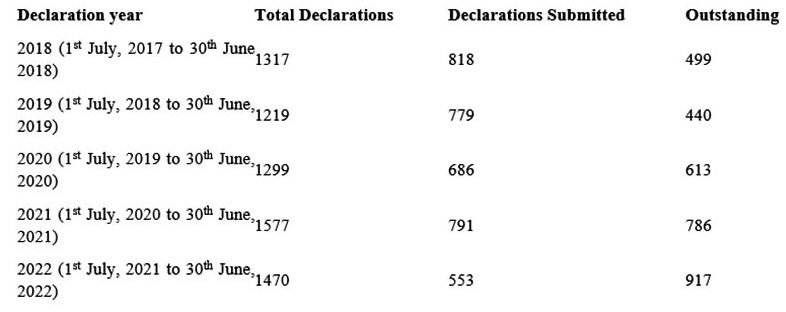The December 31st 2022 extension for the submission of declarations by persons in public life to the Integrity Commission has expired and it is unclear how many the watchdog body has received thus far.
The Sunday Stabroek reached out to the Integrity Commission for this information and it replied, through its Secretary, Dr. Amanda Singh, that, “The Office of the Integrity Commission acknowledges receipt of your email with thanks. Please note, a response to your questions will be forthcoming at a later date”. The members of the Integrity Commission, who were sworn in on May 31st last year after a lengthy delay, are Dr. Kim Kyte-Thomas, Mohamed Ispahani Haniff, Hardesh Tewari and Wayne Bowman. Business executive Chandra Gajraj is the Chair of the Commission. The Board of the previous Integrity Commission expired on February 21, 2021.
The Integrity Commission’s website has currently, statistics for years 2018, 2019, 2020 and 2021 as at 31st December, 2022. According to the data, for the year July 1st 2021 to 30th June, 2022, the total number of Persons in Public Life who are required to submit their declarations stood at 1,470, however, only 553 declarations were submitted, meaning that 917 Persons in Public Life did not submit their declarations, as mandated, for that period. The Table below, which gives the breakdown for the years 2018 – 2021, was extracted from the Commission’s website.

The Commission, after analyzing the declarations, has to submit its annual report to the President, within three months of the close of the calendar year, outlining the various activities undertaken for that period, including any difficulties experienced in the discharge of the Commission’s functions. This report must then be laid in the National Assembly within 60 days of its issue.
For years, critics have said that the Integrity Commission has not functioned properly and is not holding public officers under its purview accountable.
Reminded
Two months into their life, in late July 2022, the Commission announced that it was giving an August 10th 2022 deadline for submissions, as it revealed that several Public Offices – including several ministries – were in default. The Commission then gave a second extension, December 31st 2022, for all Public Offices to submit their outstanding lists containing the names of all specified Persons in Public Life. The Commission had explained that the list relates to the 2022 Declaration period starting July 2021 and ending June 30th, 2022. According to the ad, the watchdog body listed the Ministries of Amerindian Affairs, Foreign Affairs and International Cooperation, Housing and Water and Public Works as Public Offices in default. Regional administrations for Regions 2, 4, 7, 8, and 10 as well as state government agencies and departments such as the Burrowes School of Arts, Castellani House, the Guyana Police Force and the Guyana Rice Producers Association were among others who were also asked to submit their lists.
All town councils, with the exception of the Georgetown Mayor and Town Council, were also asked to submit theirs along with the University of Guyana, the Board of Directors of President’s College, the Police Complaints Authority, the National Sports Commission, the Presidential Guard Service, the Supreme Court of Judicature, the National Sports Commission and the National Drainage and Irrigation Authority. It had also reminded all specified persons in public life to submit their 2022 Declarations of Assets and Liabilities on or before December 31, 2022. The Commission warned that persons who are non-compliant are subject to Section 22 of the Commission’s Act.
Assessing the history and tenure of respective Commissions since the new Act was enshrined in 1997, former Auditor General, Anand Goolsarran had said that it was time for the Integrity Commission to get its act together. He listed such areas as (i) arranging for the prosecution of public officials who failed to submit their financial declarations; (ii) investigating apparent mismatch between declarations and ownership of assets (inclusive of beneficial ownership) as well as observable lifestyles; (iii) conflicts of interest; and (iv) violations of the Code of Conduct as needing key focus by the body.
Functional
Goolsarran also noted that the former APNU+AFC government had indicated that it would have strengthened the Commission with investigative and prosecutorial powers, and to make it a constitutional body with a reporting relationship to, and oversight by, the National Assembly. He noted that former Prime Minister, Moses Nagamootoo, had stated that he was examining recommendations for an amendment to the Act. “The former Prime Minister further stated: ‘It is awful that the Commission, where persons in high offices were expected to declare their assets, was headless for several years.
It remains so to this day and we need a process by which we can have this important body reconstituted and perform the functions for which it has been established to ensure that we don’t have officials and others benefitting from disproportionate wealth, or ill-gotten wealth, or unjust enrichment.’” The then President, David Granger added his voice by stating that the Commission was poorly funded and dysfunctional, and that the intention was to promulgate the necessary legislation to make it functional.
In February 2018, mainly through the efforts of civil society, the Commission was reactivated with the appointment of three new members under the chairpersonship of retired Judge Kumar Doraisami. The other members were: Rabindranauth Persaud and Rosemary Benjamin-Noble.
Far from adequate
But again, Goolsarran noted, “no action was taken to strengthen the role of the Commission via legislative changes. That apart, the Commission’s budgetary allocations were inadequate to enable it to effectively discharge its mandate. For example, the budget in 2017 was a mere $19.21 million or $1.652 million per month, and it is not clear what the staffing was at that time…At the end of 2020, there were eleven staff members, with a budget of $42.168 million, equivalent to US$210,000. In contrast, Jamaica’s Integrity Commission, which merged the roles, activities and responsibilities of the Office of the Contractor-General, the Commission for the Prevention of Corruption, and the Integrity Commission into a single anti-corruption agency, had a staffing of 105 in 2020 and a budget of J$526.5 million, equivalent to US$3.7 million,” he added.
Within the law
Comparatively, over in Trinidad and Tobago, its Integrity Commission provides a detailed end-of-year report to the public on its accomplishments. It provides figures for ex parte applications that were filed for outstanding Declarations and Statements of Registrable Interests and informed that some 1,592 court orders were obtained from the High Court pursuant to ex parte applications. For last year, the T&T Commission said that it served 521 court orders for non-compliance with ex parte orders and that 517 outstanding Declarations and Statements of Registrable Interests were filed in accordance with orders served. Of those numbers, 37 files were sent to its DPP for prosecutable action regarding persons who did not comply with the Orders of the Court. According to the report, the T&T Commission also highlighted its Investigations’ Unit’s successes in dealing with cold cases as old as nine years and pointed out that an investigator was assigned to bring closure to 107 cold cases discovered due to an audit conducted in 2021.
Guyana’s Chairperson told this newspaper, when contacted last week, that the Commission here would use its powers and “act within the law as it is stipulated”. “The Integrity Commission knows what the law is and will act within that law…,” Gajraj said.






